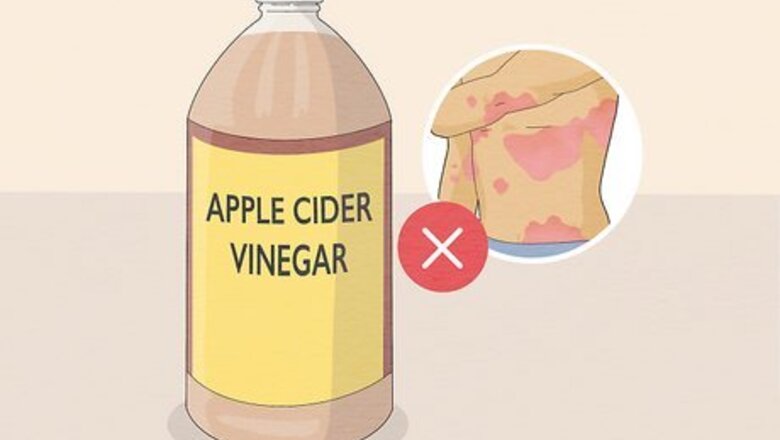
views
Does apple cider vinegar help with psoriasis?
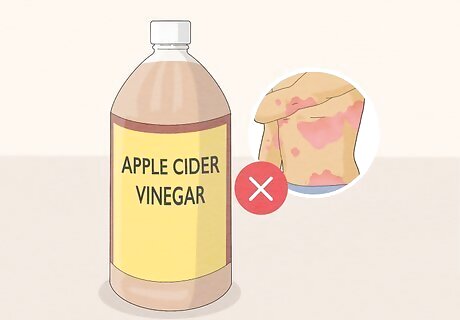
No, it’s probably not going to do much for your psoriasis. Some people claim that apple cider vinegar is antibacterial or anti-inflammatory, but there’s not a lot of good evidence that this is the case. In fact, it doesn’t actually appear apple cider vinegar does much of anything to help improve the health of skin. If anything, it’s likely just going to irritate or damage your skin if it’s already feeling sensitive. Very few of the apple cider vinegar skin remedies out there are based on any scientific foundation. It’s true that people have historically used apple cider vinegar for a variety of conditions for hundreds of years, but there’s just no science behind a lot of those practices. There isn’t any good evidence that vinegar will prevent infections, either.
Why isn’t apple cider vinegar ideal for psoriasis?
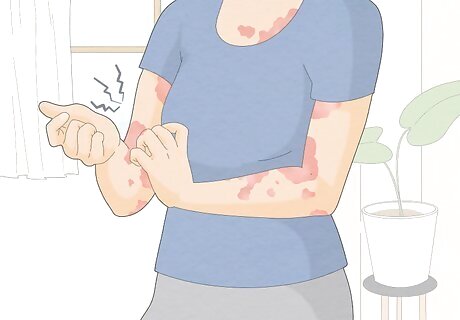
Apple cider vinegar won’t soothe any of your symptoms. Vinegar is slightly acidic, and the premise here is that when you have a skin problem your skin’s pH is off, so adding an acid should rebalance it. Unfortunately, vinegar doesn’t appear to have anything more than a temporary impact on skin pH, and you’re likely to experience additional pain or irritation on your already-sensitive skin.
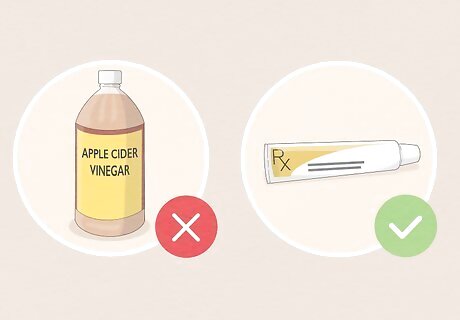
Vinegar can’t treat the underlying causes of psoriasis. Even if apple cider vinegar were good for your skin, it still likely wouldn’t help with the underlying problem. Psoriasis is caused by an overactive immune system and it often flares up due to environmental triggers. Unfortunately, putting apple cider vinegar on your skin won’t help your immune system, and it won’t minimize the impact of environmental triggers. The topical medications doctors prescribe for psoriasis are all designed to slow skin cell growth, reduce inflammation, and minimize plaque buildup. Apple cider vinegar has no influence on skin cell growth or plaque, and it can actually cause inflammation in rare cases.
Is it safe to put apple cider vinegar on your skin?
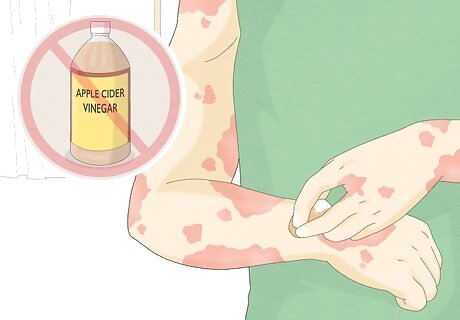
Not really, since it can potentially damage or burn your skin. Apple cider vinegar is acidic, and it’s prone to irritating sensitive skin. In fact, roughly 4-8% of vinegar is acetic acid, a naturally-occurring chemical that can physically erode your skin. There are instances of people chemically burning their skin with apple cider vinegar treatments, so you’re better off skipping this one.
Will drinking apple cider vinegar help with psoriasis?
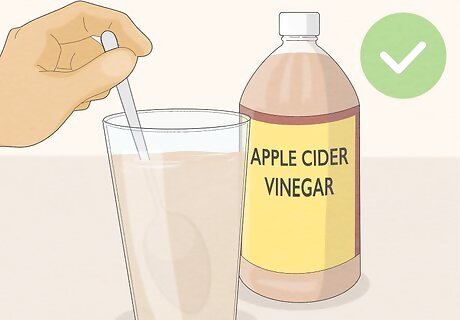
There’s no evidence one way or the other. There isn’t any conclusive evidence that drinking apple cider vinegar will have an impact on your skin. It’s safe to drink in small amounts, and there’s some minor evidence that it can help you lose weight, but you likely won’t fix your psoriasis by drinking apple cider vinegar. If you do want to drink it, dilute it heavily with water. Vinegar’s high acidity can irritate your throat or erode tooth enamel if you drink it straight. Don’t do this if you’re diabetic. Consuming apple cider vinegar can alter your insulin levels.
Can I use apple cider vinegar for scalp psoriasis?
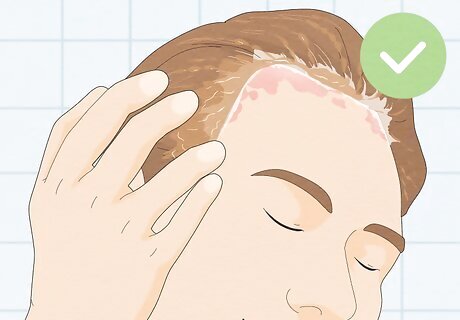
Yes, it may help relieve an itchy scalp! There aren’t a ton of studies on this, but the National Psoriasis Foundation does suggest using apple cider vinegar specifically for psoriasis on your scalp. Use 100% organic apple cider vinegar and dilute it with water so that it’s 50% vinegar and 50% water. Apply the vinegar and water to your scalp by hand and rinse your scalp with water after the vinegar dries. Doing this several times a week may reduce your itchiness and irritation. Do not do this if you have open wounds, cracked skin, or your scalp is bleeding.
What’s the most effective treatment for psoriasis?
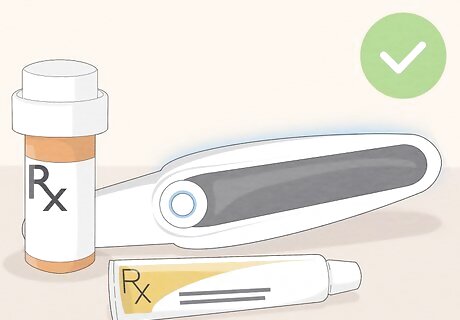
Topical creams, light therapy, and medication are all effective. There are three ways that doctors will approach psoriasis treatment: creams, light therapy, and medication. These are all effective options, but what works for one person may not work for you. See your doctor to explore the various options out there. Topical creams and ointments reduce inflammation, soothe pain, and moisturize your skin. You can buy medical-grade creams that have been clinically tested. Try applying thick emollient lotions throughout the day, especially within the first few minutes of a shower. Avoid buying them from unknown websites on the internet. If their price is extremely low compared to their retail price, they may not be worth buying. Light therapy involves exposing your skin to high levels of UVB light for a few minutes. This stunts the growth of skin cells, which are the cause of those obnoxious rashes. Oral medications and injections help to suppress inflammation, or keep your immune system from overreacting.
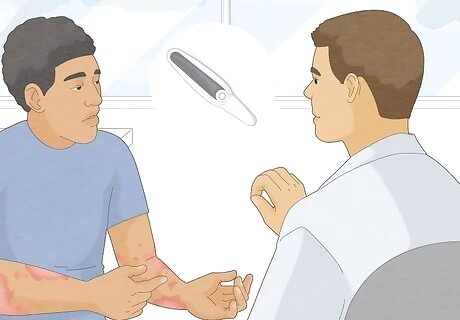
Work with your doctor to find the best combination for you. Some people get no benefit from something like light therapy, while others see massive benefits. Everyone is different, and what’s ideal for you may not be ideal for someone else. This is why it’s so important to work with your doctor to find the best treatment combination for you. It may take a bit of trial and error to find the best treatment for you. It can be irritating to spend so much time trying treatments that don’t work, but rest assured that psoriasis is very treatable once you find the best combination for you.
How can I speed up the healing process for psoriasis?

Reducing your stress levels will have a huge impact. Stress is a common trigger for many people with psoriasis. If possible, avoid situations where you suspect you’re going to get stressed out. Develop a coping mechanism, like deep breathing exercises, to treat stress in the moment. Get plenty of sleep, exercise regularly, and eat a healthy diet. All of this should help to minimize your outbreaks and speed up healing time. Soaking your skin in Epsom salts may help alleviate psoriasis discomfort. This can become a vicious cycle if your psoriasis causes you stress. You see the skin patches, they stress you out, and then the stress makes things worse. Do your best to remind yourself that psoriasis is exceptionally common, and it will go away. If you don’t treat it like a big deal, it will disappear sooner than you can imagine!
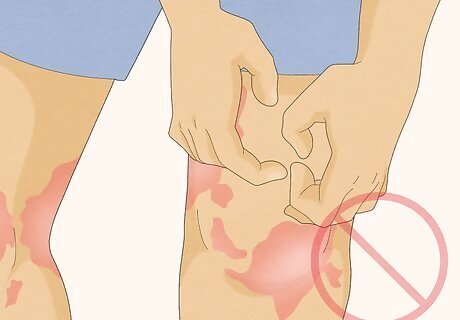
Keep your skin clear and healthy, and avoid inclement weather. Avoid harsh and abrasive soaps, don’t scratch, and put sunscreen on if you’re going outside. The more your skin gets damaged, the more likely those psoriasis patches will be to stick around. Crazy changes in the weather can also keep your skin from healing, so cover up if you’re heading out in the cold or keep your skin clear if it’s going to be hot outside.
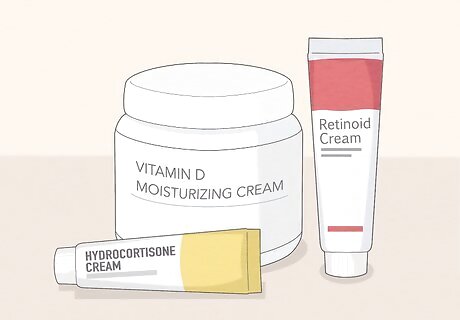
Apply a corticosteroid, vitamin D, or retinoid cream to your skin. Your doctor may have prescribed you a cream or ointment, and if they have, use that as directed. Otherwise, swing by your local pharmacy and pick up a healing cream or ointment containing vitamin D or retinoids. Read the label and apply the healing cream to your skin as directed. This should help your psoriasis clear up. You could also use a product that contains salicylic acid or coal tar. These are less popular options for psoriasis, though.




















Comments
0 comment